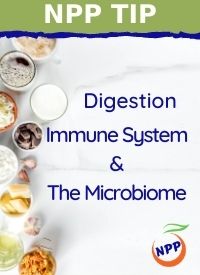Scroll down to listen to the audio!
 In North America, many of us are obsessed with cleanliness. Actually, we need to be exposed to bacteria, fungi, and viruses in order to have a healthy, strong immune system. By killing off our good bacteria with antibiotics, stress, cortisone, and chlorinated drinking water, we leave the field wide open to pathogenic, dangerous bacteria. Too many hand sanitizers and anti-bacterial soaps can change our PH and, in turn, mess with our immunological balance. Also, chemicals in plastics, cosmetics and clothing may negatively affect our microbiome which in turn affects the integrity of the small and large intestines.
In North America, many of us are obsessed with cleanliness. Actually, we need to be exposed to bacteria, fungi, and viruses in order to have a healthy, strong immune system. By killing off our good bacteria with antibiotics, stress, cortisone, and chlorinated drinking water, we leave the field wide open to pathogenic, dangerous bacteria. Too many hand sanitizers and anti-bacterial soaps can change our PH and, in turn, mess with our immunological balance. Also, chemicals in plastics, cosmetics and clothing may negatively affect our microbiome which in turn affects the integrity of the small and large intestines.
The Human Microbiome consists of a collection of trillions of tiny microorganisms that make up who we are. They are part of us, not an addition to us. They help the body digest food and nutrients that the stomach is unable to digest. They also help in the production of some vitamins, like B and K. They program our immune system which needs their bacteria to teach it to function properly – to identify which should be there and which should not and then capture and destroy the bad guys. Even viruses living in our microbiome help to establish immunity against new and more dangerous viruses belonging to the same family. Our immune system takes care of most of our colds and flues in a way that actually causes the symptoms that we experience. The more diverse our immune system is, the smarter will be its reaction. When our microbiome is in balance, all is well. If disrupted, the lining of the gut becomes more porous allowing absorption of poisons, bacteria and viruses.
The majority of our microbiome is found in the digestive system; in particular, in the intestines. Our intestines include tight junctions that prevent the harmful bacteria from entering the body’s cells. When these junctions are weakened, as in the case of leaky gut, autoimmune diseases and allergies may arise. Stress, antibiotics, sugar, high fructose corn syrup, processed and fried foods, and hydrogenated and trans fats weaken these barriers. Probiotics, particularly acidophilus, good, clean water, foods high in fibre, and also sauerkraut, pineapple, bone broth, onion, garlic and kimchi strengthens these junctions by restoring the normal flora. New research is telling us that gut microbiome may also affect our central nervous system and brain health. The gut and its organisms have even been referred to as our “second brain” having the same grey matter as found in the brain.
The Immune System and the Microbiome go hand in hand. Dysbiosis, ie pathogenic bacteria that are out of control, create a persistent imbalance in this microbial community, and are implicated in IBS, Crohn’s, Colitis, skin issues like rosacea, eczema, and acne, and in most, if not all, autoimmune diseases. Dysbiosis is also involved in gut issues like bloating, gas, constipation, diarrhea, and/or heartburn. Once we clean up the terrain, the bugs will begin to live in harmony.
Change the terrain that supports and feeds the bugs. Don’t focus on the bugs! In order to enhance the immune system, change the environment that supports the growth of these pathogenic organisms. Sugar and a diet high in carbohydrates create a welcoming home for them. Sugar also lowers immunity by 80% for 2-5 hours after it is consumed. If the terrain is filled with toxic material and undigested food, that is where you will find the bugs.
Begin to make the changes that will bring the body back into balance. Drink abundant quantities of clean water, eat organic fruits and vegetables, fibre, fermented foods, and good quality protein. Eliminate all GMO foods. Stop consuming foods that you are allergic to, lower your stress levels, and get adequate sleep. Take good care of your microbiome and it will take care of you for many years to come.
NPP Related Webinars

*Audio for those in need or who prefer to listen to our blogs:
